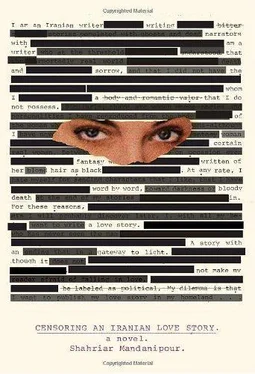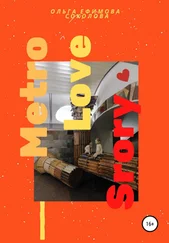Then she imagines that in the midst of the shouts of anger and spite, a muffled voice is calling her name.
“Sara …! Sara …!”
The girl wipes away her tears and looks around. There are people and shadows moving in every direction. It seems they are afraid of coming close to her.
“Dimwit …! Dimwit …! I’m talking to you!”
The voice bears the same chill and odor that gust out of a refrigerator that has not been opened in a month. The girl looks behind her. A dark face, neckless and torsoless, is suspended in the air. Two of the steel bars in the green fence surrounding Tehran University that have broken out of the stone wall have sectioned the face in three … She thinks this face belongs to one of those sprites her grandmother said have parties in the city’s public bathhouses at night and that the only way to tell them apart from humans is by their hoofed feet…
“Hey! Dimwit! Get rid of that sign and escape! I’m talking to you …!”
Again the girl looks behind her. She sees that same fluid dark face on the other side of the fence. She thinks perhaps someone is squatting down behind the wall and has lifted his head up to the fence.
“Hey! Daydreamer, go home! … Today death has it in for you. Go home! … Do you understand? It’s been half an hour since death fell in love with you. It’s sharpening its sickle to stab it into your body. Run while you can … Do you hear me …?”
No, this face and its cobwebbed voice cannot be real. Sara peeks through the fence and behind the stone wall and sees the figure of a hunchback midget dressed in clothes that seem to belong to centuries ago … She opens her mouth to ask:
What in the world do you want from me?
But her words choke in her throat. Petrified, she realizes that at this moment, any question and all the words in the world will seem absurd and meaningless. There appear to be no eyeballs in the round eye sockets on that face. They resemble two wells with moonlight reflecting on the dark water at their pit.
“What do you want with my eyes? Think of yourself. You will be killed … Do you understand? … Run! The fighting will start any minute now.”
The scuffle begins. The shouts of slogans and obscenities and the screams of boys and girls being beaten drown in the daily clamor of the city of eleven million.
We skip past this scene because it seems to have nothing to do with a love story. However, if you have paid attention, you will have noticed that I, with that notorious cunning of a writer, have described the scuffle between the police and the students in such a way that I cannot be accused of political bias.
If you ask me who I am, I will say:
I am an Iranian writer tired of writing dark and bitter stories, stories populated by ghosts and dead narrators with predictable endings of death and destruction. I am a writer who at the threshold of fifty has understood that the purportedly real world around us has enough death and destruction and sorrow, and that I did not have the right to add even more defeat and hopelessness to it with my stories. In my stories and novels there are men whom I have created with a body and romantic valor that I do not possess. Similarly, there are women whose bodies and personalities I have reproduced from the body and soul of the woman whom I have longingly seen in my dreams — although I have never had the sincerity to give this fantasy woman a permanent face so that I don’t confuse her with certain real women. Between you and me, I have on occasion even cheated on this fantasy woman and imagined and written of her blond hair as black, and once as auburn. At any rate, I hate myself for sending characters that I like, that I have scrupulously created word by word, toward darkness or bloody death at the end of my stories, like Dr. Frankenstein.
For these reasons, and for reasons that like other writers I will probably discover later, I, with all my being, want to write a love story. The love story of a girl who has never seen the man who has been in love with her for a year and whom she loves very much. A story with an ending that is a gateway to light. A story that, although it does not have a happy ending like romantic Hollywood movies, still has an ending that will not make my reader afraid of falling in love. And, of course, a story that cannot be labeled as political. My dilemma is that I want to publish my love story in my homeland … Unlike in many countries around the world, writing and publishing a love story in my beloved Iran are not easy tasks. Following the victory of one of our last revolutions — during which our shouts for freedom, with the assistance of Western media, deafened the universe— to make up for twenty-five hundred years of dictatorial rule by kings, an Islamic constitution was written. This new constitution allows the printing and publishing of any and all books and journals and strictly prohibits their censorship and inspection. Unfortunately, however, our constitution makes no mention of these books and publications being allowed to freely leave the print shop.
In the early days following the revolution, after a book had been printed, its publisher had to present three copies of it to the Ministry of Culture and Islamic Guidance to receive a permit for it to be shipped out of the print shop and to be distributed. However, if the ministry deemed the book to be corruptive, the printed copies would remain imprisoned in the print shop’s dark storage, and its publisher, in addition to having paid printing costs, either would have to pay storage costs, too, or would have to recycle the books into cardboard. This system had driven many publishers to the brink of bankruptcy.
In more recent years, to limit their financial risk and for books not to remain in storage houses for years and grow moldy waiting for an exit permit, based on a semiverbal, semiformal agreement, prior to actually printing a book, the independent Iranian publisher will voluntarily, with his own two hands and two feet, deliver three copies of the manuscript prepared with the latest typesetting and page design software to the Ministry of Culture and Islamic Guidance to receive a permit before the book is actually printed.
In a particular department at this ministry, a man with the alias Porfiry Petrovich (yes, the detective in charge of solving Raskolnikov’s murders) is responsible for carefully reading books, in particular novels and shortstory collections, and especially love stories. He underlines every word, every sentence, every paragraph, or even every page that is indecent and that endangers public morality and the time-honored values of society. If there are too many such underlines, the book will likely be considered unworthy of print; if there are not that many, the publisher and the writer will be informed that they must simply revise certain words or sentences. For Mr. Petrovich this job is not just a vocation; it is a moral and religious responsibility. In other words, a holy profession. He must not allow immoral and corruptive words and phrases to appear before the eyes of simple and innocent people, especially the youth, and pollute their pure minds. Sometimes he even tells himself:
“Look here, man! If one word or phrase escapes your pen and provokes a young person, you will share in his sin, or, worse, you will be just as guilty as those depraved people who produce pornographic films and photos and illegally distribute them among the public.”
From his perspective, writers are generally devious, immoral, and faithless people, some of whom are directly or indirectly agents of Zionism and American imperialism, and they try to deceive him with their tricks and ploys. Given his profound sense of responsibility, while he reads the typeset manuscripts, Mr. Petrovich’s heart beats wildly. As he advances page by page, slowly the words begin to make strange movements before his eyes. In his mind, amid the echoes of the words, he hears mysterious whisperings that put him on his guard. Suspicious, he goes back a few pages and reads more carefully. His face begins to perspire, and his fingers start to tremble as they turn the pages. The more he pays attention, the more devious the criminal words become. They move around; the sentences intertwine. Implicit expressions, explicit expressions, innuendos, and connotations concealed in shadows begin to parade around in his head and create an uproar. He sees that some motherfucking words are lending letters to one another to create vulgar words or raunchy images. The sound of the pages turning resembles the sound of a guillotine blade falling. Mr. Petrovich hears the hue and cry of the words explode in his ears. He yells:
Читать дальше












